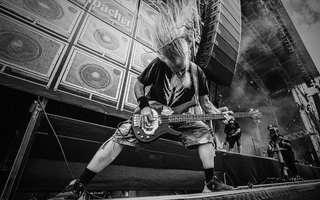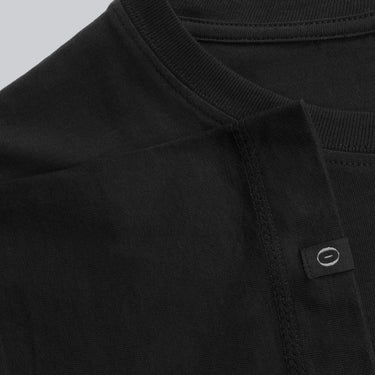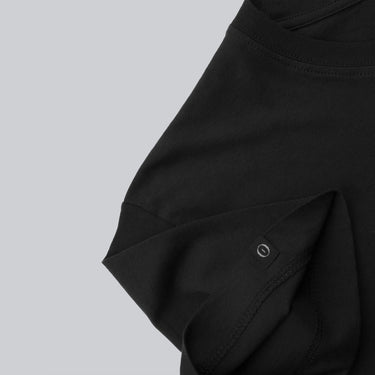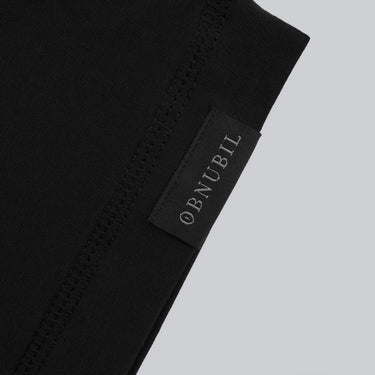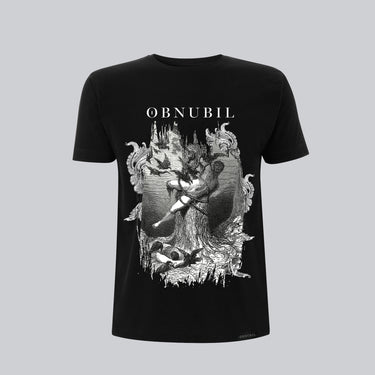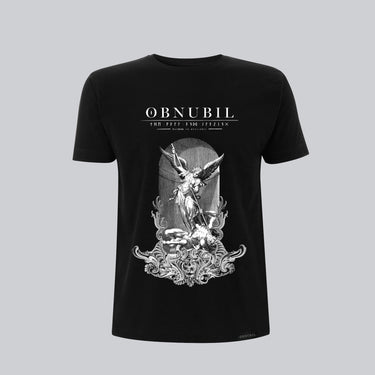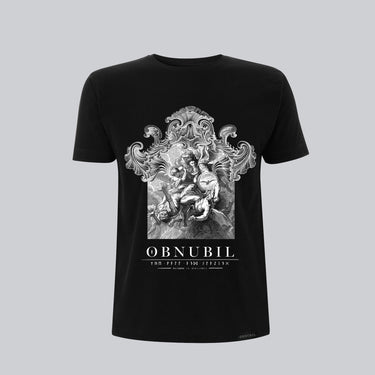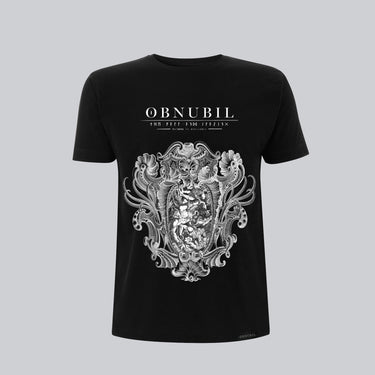
Piotr Turek, music composer, producer, and guitarist of the cinematic sludge metal band Telepathy, stands at the intersection of crushing heaviness and atmospheric beauty, crafting soundscapes that blur the lines between metal, post-rock, and cinematic composition. Telepathy, a band that dares to cover Hans Zimmer ! As a founding member of Telepathy, Turek has been instrumental in shaping the band's signature sound; an immersive blend of punishing riffs, intricate melodies, and expansive, mood-driven arrangements that tell stories without words. His dual role as both a guitarist and producer allows him to shape every detail of Telepathy's sonic world, ensuring that each track resonates with both emotional intensity and technical precision. In this interview, I had the chance to know more about Turek’s background as a musician and his creative process, exploring how he composes such vast, narrative-driven music and how his background as a producer enhances the band’s ability to translate their epic vision into a rich, auditory experience.

INTERVIEW
OBNUBIL: Hi Piotr! First of all, thanks a lot for taking the time to answer some questions. To give us a little idea about you, please tell us a bit about your musical roots. How did you get started, and what led you to become a musician?
PIOTR: I think my journey with music began as early as when I was around four years old — or at least, that's the furthest back I can remember. At the time, I was heavily influenced by my parents' music choices, and I would spend hours in my room listening to Queen and Pavarotti. Music was a constant presence in our home, even though we didn't have much money growing up in a small village in Poland. Art, photography, and music were always around, and for that, I'm incredibly grateful to my parents.
I first picked up a guitar when I was about 11 or 12, although it wasn't my first choice—I had wanted to play the drums. Unfortunately, drums were too expensive, so my mom signed up my older brother Krystian (bass player) and me for guitar lessons instead. It took some time, but I eventually fell in love with the instrument. Around the same time, I discovered bands like Deep Purple, Metallica, and Tool, which solidified my desire to be in a band.
By the time I was about to start my second year of college in 2004, I felt like my creative journey had stalled. So, I made the decision to move to the U.K., where my dad was living at the time. I'm not entirely sure why I chose to make the move — maybe it was my admiration for the British music scene, or perhaps I was trying to escape the feeling of being stuck creatively. My goal was clear though: to work hard, study music, and start a band with my brothers and anyone else I might meet along the way.
OBNUBIL: Now that we know a little more about you, let me ask you a bit more about your creative journey. In 2020, you redirected your creative energy towards film music contributing to short films and also not long ago you embarked on a Master's course in Professional Media Composition at Think Space Education. What are the most notable projects you have been able to participate in so far? What projects are you working on right now and what are your medium and short-term goals?
PIOTR: I've always been drawn to film music—sometimes, I'd find myself more excited about the score than the movie itself. My fascination with film production also started at a young age, when my friends and I would make our own movies using VHS cameras, telling stories about zombies and gangsters. When the pandemic hit, I realized I needed to channel my creative energy into something that had always been a passion but never had enough time for. Initially, I thought about making my own short films, but as I started working on ideas, I naturally gravitated towards composing demo scores.
As the months went by, I found myself spending more and more time composing, and it became clear that this was a very different but equally rewarding experience compared to writing music in a rehearsal room with a band. Composing for film, whether on paper or using software, opened up a whole new world for me.
I've had the privilege of contributing to a few short films, including Match and Is There Anybody Out There. Also, I recently created an alternative orchestral version of the Theme for The Behavior Panel's YouTube channel, which was a fun and unique project. There's always something on the go, and one of my major focuses recently has been Telepathy's new album, which I ended up mixing and producing. That project took a lot of my time, but I'll share more about it later.
I'm still at the beginning of this journey, and I've got several exciting projects lined up for the coming year. Whether my music is used in a production or simply shared for others to enjoy, I'm always eager to share my work on my platforms.
OBNUBIL: If you could choose any 3-5 movies from all over cinematic history and make their soundtrack, which movies would you choose and why?
PIOTR: My first choice would be Blade Runner. I deeply connect with its dystopian atmosphere and vintage synth sound, and I love the idea of blending futuristic and retro tones.
Next, I'd choose The Lord of the Rings. Scoring something on that scale would be an incredible challenge, especially because Howard Shore's compositions are so iconic. It's hard to imagine the films without his work, but the opportunity to create music for such an epic, emotional journey would be one in a lifetime.
Lastly, Donnie Darko would be on my list. The film has this eerie, dark vibe that would give me the freedom to experiment and explore new sonic textures. Its psychological depth and surreal atmosphere would be the perfect canvas for pushing musical boundaries.
OBNUBIL: What are your compositions usually based on and what have been your greatest inspirations from the beginning? What has been the strangest way you have discovered a sound that you have then applied to a composition?
PIOTR: Music has always been, to me, an expression of people, places, and emotions. I was never interested in using music for political purposes or as some form of youth rebellion, which I fully respect and love a lot of music like that. I can only do what is true to me, and I like the idea that instrumental music is for everyone to enjoy; no matter where you are from, you can pick it up, and hopefully, it will take you on an incredible, beautiful journey that you can write your own story to or be your soundtrack in life. I guess this has naturally influenced the Telepathy writing style and drew my attention to film music.
The strangest sound I recently made was for the short film about the first man to go to space, which was a part of my studies. I used a skipping rope to create a sound that would feel like the lift of a space probe. Experimenting and recording unique sounds is so much fun.
OBNUBIL: You have been part of Telepathy since its formation in 2011. What is the story behind the band? How did it come together and why did you choose this very different musical style of cinematic sludge-metal?
PIOTR: It was a combination of fortunate events. I moved to the U.K. in 2004 to study music, and my goal and dream were to form a band and tour the world. However, due to certain circumstances, I had to postpone my education till 2010; at this time, Albert was about to go to college, and so it happened we both decided to join the Music Technology course where we met Richard; it didn't take long to discover that we had a common approach to making music, don't get me wrong we are very different individuals, especially at the time. Still, thanks to Albert, who suggested I should try to jam with Richard, we discovered fantastic chemistry, and very quickly, tunes that we were writing with my brothers in a bedroom became Telepathy. In less than six months, four of us finished five tunes, recorded an E.P. 'Fracture' and played any show we could get.
The decision to play instrumental music came quite naturally. We did, in fact, try a few vocalists, but things didn't glue, and a kind of writing that would satisfy the vocal line wasn't something we were interested in. We were and still are excited to tell a story through music without many or any words. There is so much creative freedom and fun in making music like this, and I guess my love for film music has split and influenced that choice as well.
OBNUBIL: Sludge-metal is known for its heaviness and raw emotion, while "cinematic" suggests something expansive and atmospheric. How do you balance these contrasting elements in your songwriting and production process? Is there a particular theme or message you hope to convey through your music, given its cinematic and emotionally charged nature?
PIOTR: We have a deep love for both heavy, raw music and expansive, atmospheric soundscapes, so our approach is very intuitive — we don't overthink it. Each album evolves organically, and while we may not always know the concept right away, by the end of the writing process, it feels like the idea was there all along, waiting to be uncovered.
Each album's narrative takes shape as we write, with each track contributing to the larger story. A big part of our process involves sitting together, sharing our life experiences, and letting those moments inform the music. We also enjoy being creative with how we reveal those themes. While there's a concept, we intentionally leave a lot of it open to interpretation because we want listeners to connect with the music in their own way and bring their own vision to it. It's always exciting when fans share their thoughts and interpretations with us.
We're deeply involved in every aspect of making a record, from the first note to mastering and choosing or creating the artwork and promo photos. Everything is interconnected, like scenes in a film, and I think thematic cohesion becomes more apparent with each album.
OBNUBIL: Describe the mood and atmosphere of a hypothetical city where your music would be the soundtrack. What would it look like, and what would the inhabitants be like?
PIOTR: It's funny you ask that; the theme of our newest and upcoming record is related to a hypothetical city setting, so you'll be able to hear that very soon!
OBNUBIL: Just as you yourselves have said, writing for a new record always begins in the jam room bouncing around ideas and then hammering out the rough structure of the songs. How is the recording of the new album going? What can you tell us about it? Is there a release date?
PIOTR: The recording, mixing, and mastering are officially complete! We had an absolute blast making this record and felt more creative freedom than we've had in years. I know it's cliché to say, but we genuinely believe this is our best work yet. We recorded the album in our small home studios, and had a chance to do an extensive production on the music we always wanted to do. We feel we pushed our music to the next level, and we can't wait to share it with you. While I can't reveal too much just yet, there are plenty of exciting announcements coming very soon!
OBNUBIL: Last month of May, you released the single "Time", a cover of a piece by Hans Zimmer. Why did you choose this song? Was it very difficult for you to record? Please give us more details about it.
PIOTR: Recording "Time" was an exciting and fulfilling experience for us. We wanted to make a cover song for a while, but we were waiting for the right song that would truly inspire us. Hans Zimmer's "Time" stood out because it's a beautiful, emotional piece that resonated with us on a deep level. It also felt like a natural choice, as its atmosphere and cinematic depth align with the direction we see our new music heading. While it came with its challenges, especially trying to honour the original while adding our own twist, the process was incredibly rewarding in breaching the unknown.
OBNUBIL: “Burn Embrace” is your latest legacy released in 2020, with masterful layers of sound that could shake the planet, not only because of its onslaught, but also because of those well-achieved atmospheres that make listening to your album unique. From the tranquility to the subsequent explosion, this third album of yours has been a great work. How have you perceived the perception of this album? Has it marked a before and after for you? Does your new album aim to reach the same level or surpass it?
PIOTR: We were really pleased with the response to Burn Embrace, even though the timing of its release was quite unfortunate, dropping right at the start of the first lockdown. Despite that, we managed to do a live stream and watch people's reactions in real time, which was incredibly rewarding. However, we did miss out on the chance to tour with the album as much as we had hoped and planned.
As for the new album, I believe it marks a fresh chapter for Telepathy. It takes us on a new creative journey, pushing us in ways that are both challenging and exciting, not just artistically but also technically. While Burn Embrace was a significant milestone for us, this new record is about exploring new horizons and seeing how far we can push ourselves.
OBNUBIL: You synthesize progressive and breakneck riffs transcend audiences through astral planes of instrumental narrative. Once you commit to instrumental music, how much more or less challenging is it to compose?
PIOTR: The beauty of composing instrumental music is the creative freedom and the room for personal interpretation it allows. The challenge, though, is compensating for the lack of vocals. I truly believe the human voice is the most emotional and primal instrument, and without it, you have to work extra hard to express that same depth of feeling through other instruments. Some instruments can convey emotion more easily than others, but it's always about finding ways to make the music resonate as strongly as a voice would.
OBNUBIL: What’s the most unconventional or non-musical item you've ever used as part of your compositions, either in the studio or live? How did that come about, and what was the result?
PIOTR: We've always aimed to add unique elements to each release to make it stand out. For Tempest, we focused on creating space and subtle textures, incorporating items like thunder tubes and nature sounds. With Burn Embrace, we explored orchestral percussion, including timpani, and Jo Queil contributed amazing effects using her cello.
For the new record, we took our experimentation to another level. For example, I used an old piano in my home studio, playing its strings with various sticks and picks to create unconventional sounds. I also used a skipping rope and bolted metal bars together to produce unique textures for my orchestral and hybrid compositions, which came to use in the album production as well. Additionally, employing techniques such as a cello bow on metal elements or recording old, broken percussion instruments adds unique aspects to the music. Much of the innovation also happens during post-production, where I can modulate and refine the sounds. There are a lot of exciting new sounds on the new record, but I can't share much at this time.
OBNUBIL: You once said: "Writing music is one of the best jobs on the planet, but performing it live takes the experience to another level." What have been so far your best experiences in the world of music and especially playing live?
PIOTR: It's a highlight for me every time we head out on tour. I love being on the road so much that just that experience feels like a reward in itself—especially seeing people react to the music we've been working on. Some of my favourite gigs have been at Amplifest in Porto, Dunk Festival, and Roadburn Festival. But overall, it's the entire experience of performing and exploring different places with my bandmates that I treasure most. As for the everyday music-making process, I feel blessed to have the time to dive into the music and explore new ideas.

PIOTR: Royal Albert Hall or Red Rocks Amphitheatre would be amazing :D
OBNUBIL: Are there any new genres or styles of music you’re interested in exploring? How do you envision the future of your sound evolving? Are there new cinematic or sonic territories you'd like to explore in your upcoming projects?
PIOTR: In any style, I find a passion in trying things I have never heard, played, or tried composing before. It's a reason why I went back to school to do a Master's in Media compositions. I do have my favourite styles, and I usually gravitate towards darker or epic music, but it's very satisfying to create something you never knew you could in the first place.
OBNUBIL: And finally, one last question. Are there any specific routines, rituals, or environments you find essential for your creativity, especially when blending the heavy and the cinematic?
PIOTR: Yes, most definitely. First and foremost, I need a Jar of good coffee. The next step is to organise my creative space; it is essential to know what tools I have so I can quickly react to ideas that form in my head. A notepad and long walks with my dog. So many things come together when you do other things like cleaning the house, driving, or chopping wood.
I'd love to have more opportunities to collaborate and record more live musicians, especially for my future scores.
OBNUBIL: It has been a pleasure talking to you and getting to know you a little more! Thank you so much for taking your time answering the questions! Is there anything that you would like to say to the readers and to your fans?
PIOTR: Be open-minded, explore new music and support your local artists. Thank you to all of those who supported me and my band for all of those years and took the time to read this. I am ever so grateful and appreciative of your time. Thank you, Jaqueline, for the awesome questions.
Interview done September 2024. Photos taken by Krzysztof Turek.


